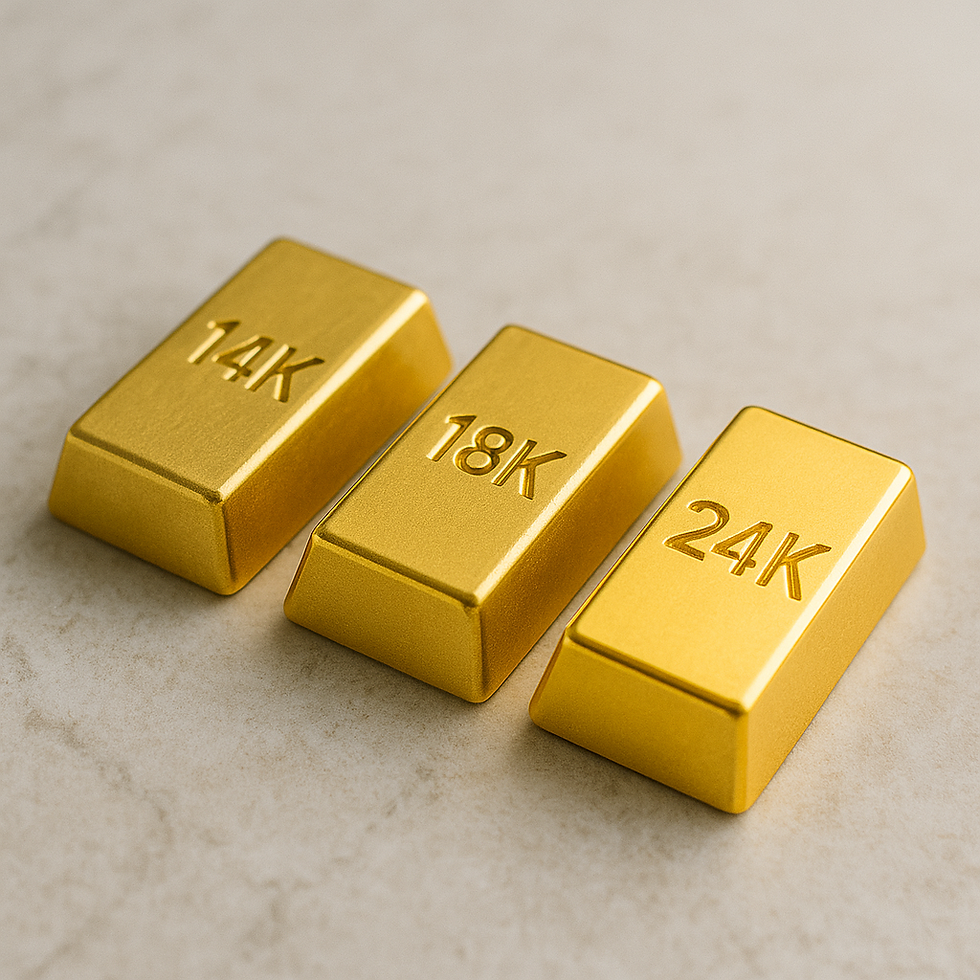What karat gold is most valuable?
- rafarce
- May 26, 2025
- 4 min read

Understanding Gold Karats
When it comes to buying or investing in gold, one of the first things you'll encounter is the term 'karat'. But what does it really mean? A gold karat (abbreviated as 'K' or 'kt') is a unit that measures the purity of gold. Pure gold is 24 karats, meaning it is 100% gold without any other metals mixed in. As the karat number decreases, so does the percentage of gold in the alloy.
Gold is often mixed with other metals like copper, silver, nickel, or zinc to improve its strength and durability. This is especially important for jewelry that is worn daily. Understanding karats is essential whether you're buying a wedding ring, investing in bullion, or simply curious about your gold jewelry's value.
Gold Karat Comparison: Purity and Composition
Here's a quick breakdown of the most common gold karats and their gold content:
24K Gold: 99.9% pure gold
22K Gold: 91.7% gold, 8.3% other metals
18K Gold: 75% gold, 25% other metals
14K Gold: 58.3% gold, 41.7% other metals
10K Gold: 41.7% gold, 58.3% other metals
The higher the karat, the more gold the item contains. However, that doesn’t always mean it’s the best choice for every situation.
Which Karat Gold Is the Most Valuable?
In terms of raw material value, 24K gold is the most valuable. Since it is nearly 100% pure, it commands the highest price per gram or ounce in the market. This makes it ideal for investment purposes and for collectors who want the purest form of gold.
However, value can also depend on context. For example, 18K gold may be more valuable in the jewelry market due to its balance of purity and durability. But if you're strictly looking at gold content, 24K is the clear winner.
Pros and Cons of Each Gold Karat
Each karat level has its own advantages and disadvantages depending on how you plan to use the gold.
24K Gold
Pros: Highest purity, most valuable, hypoallergenic
Cons: Very soft, easily scratched, not ideal for everyday wear
22K Gold
Pros: High purity, better durability than 24K
Cons: Still relatively soft, limited design options
18K Gold
Pros: Great balance of purity and strength, popular for fine jewelry
Cons: More expensive than 14K, may still scratch
14K Gold
Pros: Durable, affordable, ideal for daily wear
Cons: Lower gold content, may cause allergies in sensitive skin
10K Gold
Pros: Very durable, budget-friendly
Cons: Lowest gold content, less lustrous, can tarnish
Best Karat Gold for Jewelry
When choosing gold for jewelry, it's not just about value—it's about practicality. Here's what to consider:
For engagement rings or wedding bands: 14K or 18K gold is ideal due to its durability and beauty.
For heirloom or luxury pieces: 18K or 22K gold offers a rich color and higher value.
For occasional wear: 22K or even 24K can be used for special pieces that aren’t worn daily.
While 24K gold is the purest, its softness makes it less suitable for rings or bracelets that are exposed to frequent wear and tear.
Gold Karat and Investment Value
If you're investing in gold, purity matters. 24K gold is the best option for investors because it holds the highest intrinsic value. It’s typically sold in the form of bars, coins, or bullion and is easy to resell based on market prices.
However, some investors also consider 22K gold coins, especially those minted by government mints, as they often carry legal tender status and are widely recognized.
Keep in mind that jewelry, even if made of 24K gold, often includes labor and design costs that don’t contribute to its melt value. For pure investment, stick to bullion or coins.
How to Choose the Right Karat for You
Choosing the right gold karat depends on your needs, lifestyle, and budget. Here are some helpful tips:
For daily wear: Go with 14K or 18K for a good mix of strength and beauty.
For special occasions: 22K or 24K offers a luxurious look and higher value.
For investment: 24K gold bars or coins are your best bet.
For gifts: 18K gold is often seen as a premium choice that balances elegance and durability.
Also consider skin sensitivity. Higher karat golds are less likely to cause allergic reactions because they contain fewer alloy metals.
Frequently Asked Questions About Gold Karats
Is 24K gold better than 18K? In terms of purity and value, yes. But 18K gold is more durable and better suited for jewelry.
What karat gold is best for engagement rings? Most jewelers recommend 14K or 18K gold for engagement rings due to their strength and resistance to scratches.
Does higher karat gold tarnish? Pure gold (24K) does not tarnish. Lower karat golds may tarnish over time due to the presence of other metals.
Is 10K gold real gold? Yes, 10K gold is real gold, but it contains only 41.7% pure gold. It’s the minimum karat that can legally be called gold in many countries.
Why is 24K gold not used in all jewelry? Because it is very soft and can bend or scratch easily, making it impractical for everyday wear.
Conclusion: What Karat Gold Is Most Valuable?
To sum it up, 24K gold is the most valuable in terms of purity and price per gram. However, that doesn’t automatically make it the best choice for every situation. For jewelry, especially pieces worn daily, 14K or 18K gold often provides better durability and practicality. For investment, 24K gold bars and coins are preferred due to their high purity and market value.
Understanding the differences between gold karats helps you make smarter decisions—whether you're buying a necklace, choosing a wedding ring, or diversifying your investment portfolio.
Always consider your lifestyle, budget, and purpose before choosing the right karat. And remember, no matter the karat, gold remains one of the most timeless and treasured materials in the world.



Comments